Glass speaks to rising-star Mia McKenna-Bruce about her latest role in the rite-of-passage film, How to Have Sex, and what we can learn from it
From Winter Issue 56
“Look up” were the words Mia McKenna-Bruce heard when the lights switched back on after How to Have Sex premiered at the 2023 Cannes Film Festival. “I turned around and everyone was standing up clapping.” The applause lasted eight minutes. Hours later it won the prestigious Un Certain Regard award.
And now, days after its release in UK cinemas, the film has already accumulated more than 30 nominations, garnered endless five-star reviews and shone a spotlight on its cast. Her role in this is not so much a jump to the bigger leagues in Hollywood, it’s more being propelled into the cinematic zeitgeist.
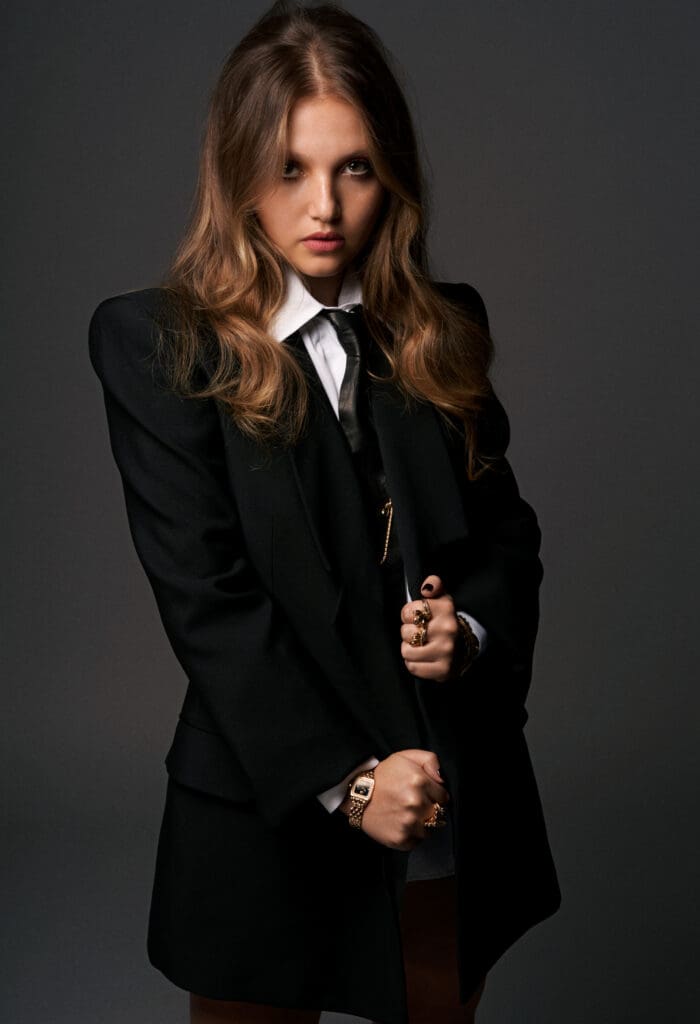
Photographer: James Anastasi
“It’s kind of mental,” blushes the 26-year-old. “It’s been very all or nothing. I had a baby 10 weeks ago so before that it was all quite quiet. Then all of a sudden, boom, it’s not. It sounds so cringy and cliché but my dreams are happening at the same time.”
She’s currently living without a pause. On the one hand, she’s become a mother for the first time. On the other, she’s been lauded as Britain’s next big thing, scooping her up to attend red carpets, photoshoots and interviews. Despite the full-speed transition, she’s nothing but grateful, given that she has spent her whole life as a performer waiting for this moment.
“My dad sent over a poster of How to Have Sex to my family group chat, saying how he knew when he took me to that poetry competition in Bromley [Kent, as a child] that this would happen one day.” But even before winning this recital at her primary school, McKenna-Bruce knew she wanted to be on stage.
“I started going to the local dance club when I was two years old. I had a lot of energy from early on so I did a different class every night,” she explains. “I’ve always been very loud. I think it’s because I’m small. I make sure everyone is aware I’m present so I won’t get trodden on.”
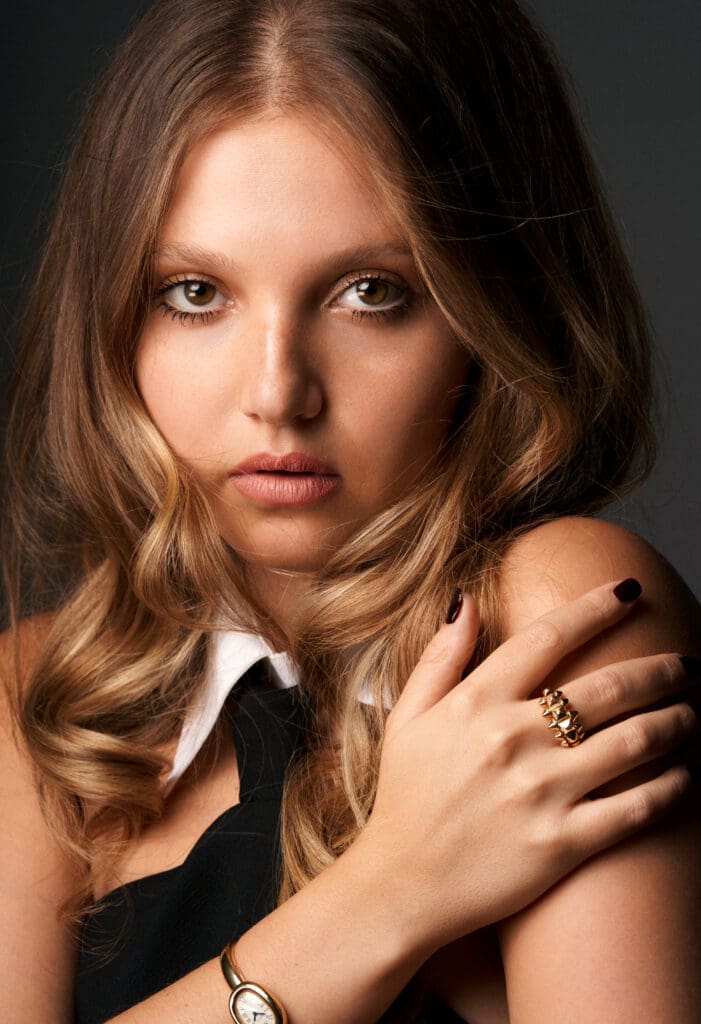
Photographer: James Anastasi
Channelling her youthful enthusiasm into various forms of movement naturally led her to set her sights on becoming a ballerina. But it wasn’t until she saw Titanic that her mind changed. “I was completely traumatised by it,” she explains with a laugh. “My mum had to get my grandad to pretend on the phone that he was the director and explain that it was a film and these were actors.”
For any six-year-old, James Cameron’s cinematic masterpiece may have been a stretch too far from cartoons. But, for McKenna-Bruce, it was a game changer. “I mean it did the job. It was the thing that spurred me into being like ‘Oh this is a job. I want to do this’.”
Not wanting to waste a second longer, it didn’t take long for the young girl to discover Shirley Temple. “I became obsessed,” she recalls. “At the time I was, like, ‘what child actors are there?’ There happened to be a documentary about Shirley Temple and I recorded it on TV and watched it every day after school, making all these notes about her, like how she had exactly 52 ringlets in her hair.” The hyper fixation paid off.
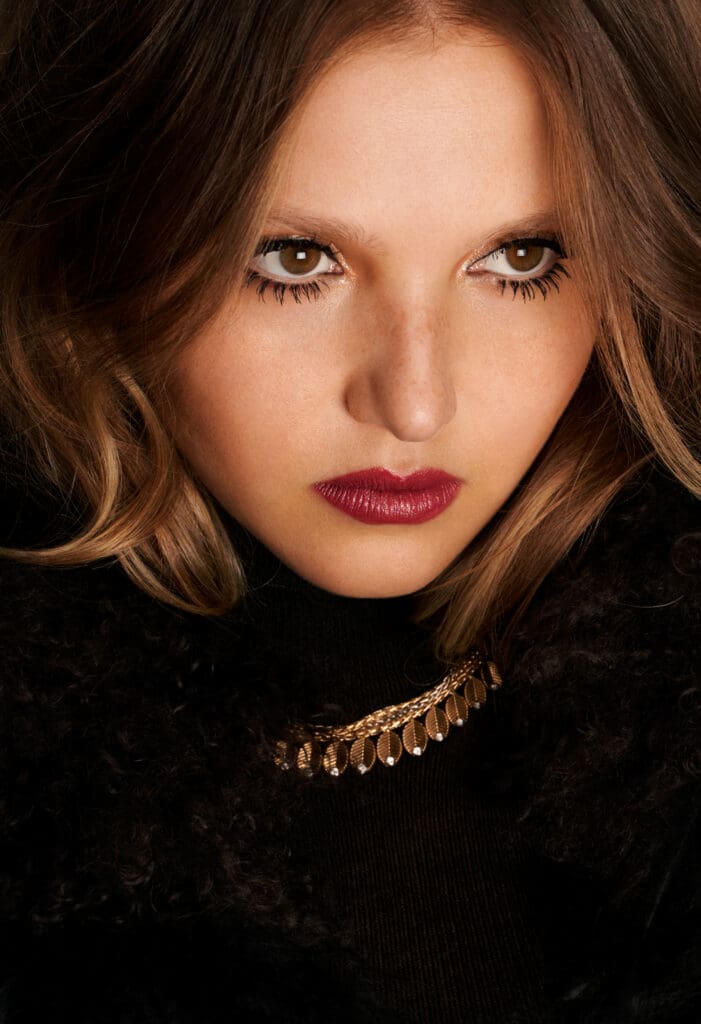
Photographer: James Anastasi
After spotting an audition call-out in a newspaper for an amateur production of Seussical The Musical in Croydon, McKenna-Bruce convinced her parents to take her along despite their apprehensions. “They wanted to manage my expectations, like just be happy you’re doing an audition, this is an experience,” she remembers. “It was all very much this is probably as far as it’ll go.” A few weeks later, she got called into her headteacher’s office with her mum at the end of the phone call: “You got the part!”
It just so happened that Rob Kelly, the choreographer for the play, was also a casting director with an agency specifically for young actors. Offering her a spot on his books, Kelly taught her the ins and outs of how to create a career in acting. “I say ‘navigate’ a career, I was eight-years-old and it was still very much a hobby.” She laughs at her naivety. “But he got me the audition for Billy Elliot and I somehow wangled my way into that show.”
What came next was a recurring role in the West End production of Billy Elliot the Musical. After spending two years in a cycle of four showcases a week, the time finally came to move on. After a few minor appearances in British TV classics like Holby City and EastEnders, McKenna-Bruce moved to children’s television, taking on the role of Tee Taylor in the CBBC sequel series, Tracy Beaker Returns.
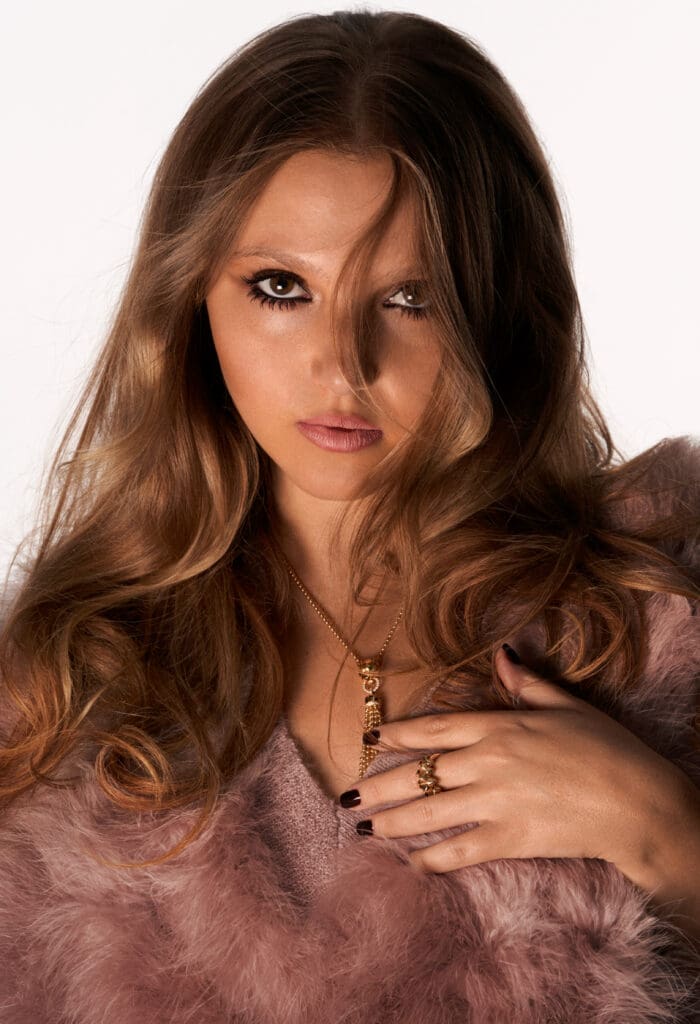
Photographer: James Anastasi
It was here she began to lay the foundations of becoming a household name – and recognisable face – as she immersed herself in the role for more than six years. “I played her for such a long time that I was able to morph into the character that I created. She became a version of myself,” she says, looking back at that time.
“[The cast] grew with each other. We knew each other inside out. We knew these characters inside out. There was no situation that anyone could throw us in that we didn’t know what to do with our characters because we almost created them in some way.”
“Now, I’m really enjoying work that resonates with a lot of people,” she adds. “It’s nice to be able to know where you start, know where you end, and then be able to talk about it with people. It’s what I am really enjoying now with How to Have Sex, being able to reflect on what we did and what we made.”
The film in question is Molly Manning Walker’s directorial debut – a British indie drama that follows Tara (played by Mia) and her two school friends, Em (Enva Lewis) and Skye (Lara Peake) as they party in Malia post-GCSEs.
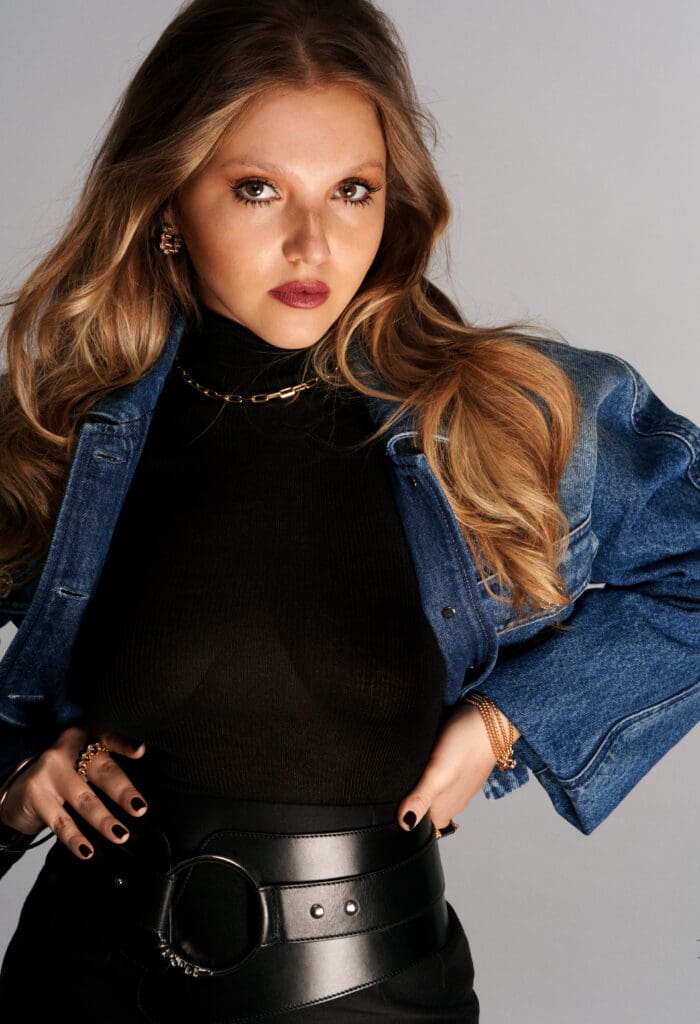
Photographer: James Anastasi
On the surface, this is a classic coming-of-age tale, where you see these girls dance on the edge of womanhood adorned with tight dresses, blue fish bowls of cocktails and blissful naivety. But digging a bit deeper, there is an overt pressure from the start for Tara to gain some sexual experience, with her friends mocking her for still being a virgin, as if that were something to be embarrassed about. Upon meeting some lads in their hotel, the groups merge, with one of them taking an increasing, non-reciprocal liking to Tara. What happens next, you’ve probably already guessed. This is a film about consent – and lack thereof.
“I definitely felt a sense of responsibility,” she says about taking on the lead. “From the first time I read the script, it was something that I wish I had seen when I was that age. It’s something I really wanted to be a part of making because I want my sisters to watch this. I felt it would have been important to me to see this, therefore it’s going to be important to a lot of people.”
Manning-Walker does not offer an entirely new perspective on a story we all already know but rather vividly illustrates an amalgamation of experiences tied into growing up, especially as a girl. The film is not meant to have a happy ending or have a Prince Charming. It’s meant to sit with you, to make you think about the delicacies of intimate moments.
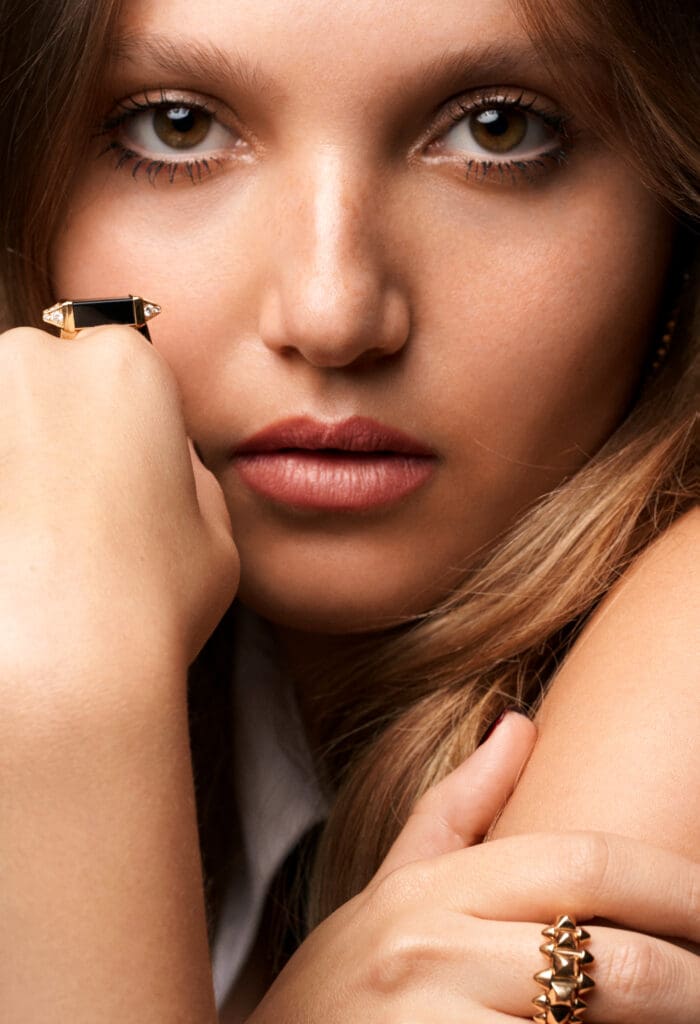
Photographer: James Anastasi
While the lessons are nuanced in each scene, what did she learn from Tara? “Even experiencing first-hand the journey she goes on from the pressures [of being extroverted] that she’s getting from her friends – and that’s not just something you have when you’re 16. I definitely have been experiencing that now, like you do try and [act how] you think everyone expects of you,” she replies. “I learnt that from her. You don’t need to put yourself in certain situations or give people what they want just because you’re a big bubbly personality”.
The past month has been an overwhelming whirlwind, so I take her back to the present moment and ask what message she hopes this film leaves viewers with. “Obviously there’s a lot you can take from the film. It evokes a lot of emotions,” she concludes.
“But, I think the one thing we have come to is just to be a good person. A person can tell you so much just from their body language and everything like that. I don’t know when we lost that in humanity of just bypassing that. So, just be a good person and realise how much your actions can affect other people”.








